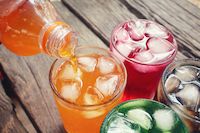Article
Fruit Juices, Not Just Soda and Other Sugary Drinks Linked to Diabetes
Author(s):
A new study from the Harvard T.H. Chan School of Public Health found increasing consumption of sugary beverages, including 100% fruit juices, by half a serving per day could increase a person's risk of diabetes by 16%.

A Harvard School of Public Health study has found that it may not be artificially sweetened beverages driving the epidemic of diabetes, with results indicating sugary beverages including 100% fruit juices can increase the subsequent risk of type 2 diabetes.
The analysis revealed that consumption of sugary beverages, including sugar-sweetened drinks and 100% fruit juices, by half a serving per day increased a person’s risk of developing diabetes by 16% and that substituting these drinks with artificially sweetened beverages did not lessen that risk.
In an effort to further expound on the data surrounding consumption of sugary beverages and the risk of developing diabetes, investigators performed a retrospective study on 192,352 participants from in the Nurses’ Health Study, Nurses’ Health Study II, and the Health Professionals’ Follow-up Study—these studies ran from 1986 through 2012, 1991 through 2013, and 1986 through 2012, respectively.
Dietary information was collected and updated every 4 years for all participants involved in the study. Participants were asked how often, on average, they consumed a standard portion size of each food or beverage, from “never or less than once per month” to “6 or more times per day”. Investigators noted a standard portion size is defined as an 8-ounce serving per day.
A total of 2,783,210 person-years of follow-up were documented in the study. During that time period, investigators identified 11,906 incident cases of type 2 diabetes.
Investigators noted a multivariable analyses adjusting for initial and changes in diet and lifestyle covariates, as well as BMI. Upon analyses, investigators found increasing total sugary beverage intake by half a serving per day over a 4-year period was associated with a 16% (95% CI 1%-4%) higher diabetes risk in the following 4 years.
Additionally, an increase of artificially sweetened beverages by half a serving per day over a 4-year period was associated with an 18% (95% CI, 2%-36%) increase in diabetes risk. Based on the results of the analyses, investigators determined replacing one daily serving of a sugary beverage with water, coffee or tea, but not an artificially sweetened beverage, was associated with a reduction in diabetes risk between 2% and 10%.
Investigators of the study noted multiple limitations within their study. Due to these limitations, they expressed caution when interpreting results due to the possibility of reverse causation and surveillance bias.
"The study results are in line with current recommendations to replace sugary beverages with noncaloric beverages free of artificial sweeteners. Although fruit juices contain some nutrients, their consumption should be moderated," said senior investigator Frank Hu, MD, Fredrick J. Stare professor of nutrition and epidemiology at Harvard T.H. Chan School of Public Health.
This study, “Changes in Consumption of Sugary Beverages and Artificially Sweetened Beverages and Subsequent Risk of Type 2 Diabetes: Results From Three Large Prospective U.S. Cohorts of Women and Men,” was published online in Diabetes Care.




